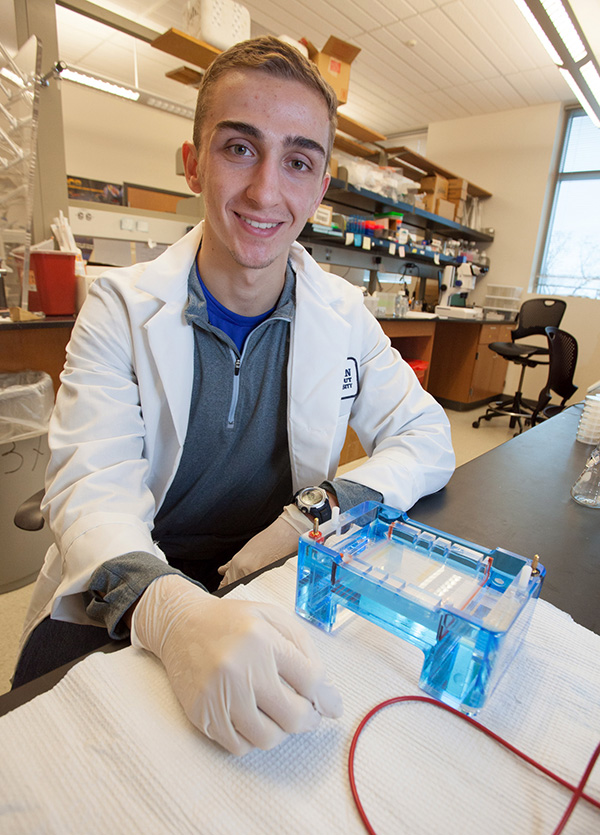- Apply
- Visit
- Request Info
- Give



Published on April 07, 2020
 Christopher Shimwell ’20, a biology major at Eastern Connecticut State University, received an excellence award from the Eastern Colleges Science Conference (ECSC) for his manuscript titled “Molecular Characterization of the Scorpion Telson.” Shimwell would have received the award at the conference’s 74th annual meeting this April at Sacred Heart University, but ECSC organizers cancelled the event due to the COVID-19 pandemic.
Christopher Shimwell ’20, a biology major at Eastern Connecticut State University, received an excellence award from the Eastern Colleges Science Conference (ECSC) for his manuscript titled “Molecular Characterization of the Scorpion Telson.” Shimwell would have received the award at the conference’s 74th annual meeting this April at Sacred Heart University, but ECSC organizers cancelled the event due to the COVID-19 pandemic.
Shimwell’s project investigates the microbiomes of a scorpion’s venom and telson, which is its venom-producing appendage. Microbiomes are the collection of microbes that live on and in an organism. This host of microbes supports the immune system, aids in digestion and provides pathogen protection for the organism.
“Scorpions represent an ancient lineage and were one of the first organisms to adapt to life on land,” writes Shimwell in his manuscript’s abstract. “Perhaps this success is in part a result of scorpion microbiomes?”
His abstract continues: “In some venomous organisms, microbes generate toxins that contribute to the potency of their venom cocktails, increasing the host’s ability to capture prey and deter predators. Despite the importance of the microbiome in some venomous organisms, there are no reports of bacteria detected in the scorpion telson, where venom is produced.”
Shimwell and his faculty mentors in the Biology Department, Matthew Graham and Barbara Murdoch, hypothesized that the scorpion telson does contain bacteria. They isolated DNA from the telsons of two different scorpion species and used molecular techniques to amplify certain bacterial genes. Results found that not only do telsons contain bacterial inhabitants, each scorpion species also harbors a unique suite of bacteria in their telson microbiome.
“To the best of our knowledge, our research is the first evidence suggesting the presence of bacteria in these scorpion structures,” said Shimwell. “Future studies could build off this and test if these bacteria produce antibiotics or venom peptides. Further, our study sheds light on the possibility that the scorpion venom composition may be reliant on their microbiome. The venom microbiome may also be a resource for novel bacteria that could produce novel antibiotics.”
Up to 200 students present at the ECSC annually. Typically, fewer than 20 submit full-length manuscripts. Of those, only a few qualify for an excellence award. Each manuscript is evaluated by someone who has professional expertise in the discipline covered by the research topic and who is not from the same institution as the author. The evaluator is charged with examining the manuscript and determining whether or not it should be given an excellence award.
“Relative to the number of platform and poster presentations, few undergraduates submit full-length papers for consideration for an ECSC excellence award,” said Donald Stearns, chair of the ECSC Board of Trustees. “Full-length research manuscripts are especially noteworthy accomplishments. Such a paper presents a much higher challenge than just preparing for a presentation.”
Commending Professors Murdoch and Graham, Stearns added, “It is important to note that Mr. Shimwell was mentored through the research and writing processes. Research is a collaborative endeavor; the credit should be shared by the team.”
Shimwell has been working on this project for the past three years working as an emergency medical technician in Rocky Hill and as a patient care assistant in the intensive care unit at Hartford Hospital. He plans to enroll in Yale University’s physician assistant (PA) program this coming August, with aspirations to become a PA in a primary care setting for medically underserved populations.
Since 1947, the ECSC has provided a forum for undergraduates from 20-30 colleges and universities to present their empirical research in the physical, chemical, biological, health and social sciences, as well as education, computer technology engineering and mathematics, using the general format of a professional meeting.
Written by Michael Rouleau